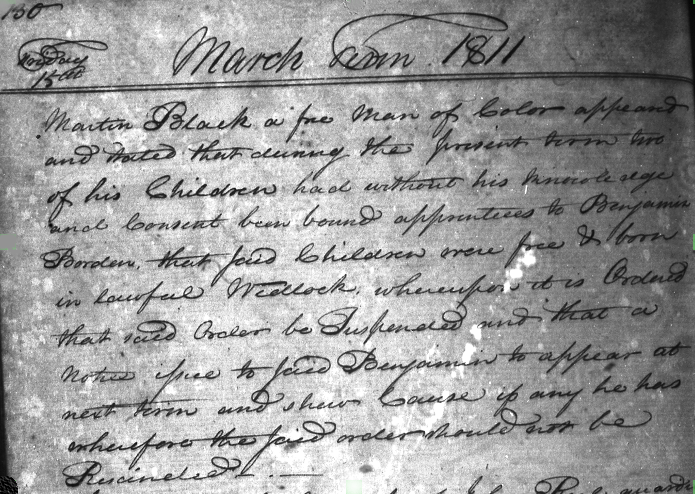ca. 1751-1821

Martin Black was a Black soldier, prisoner of war, and landowner during the American Revolution. He was born free around the year 1751 in Craven County, North Carolina. He was the son of Elizabeth “Betty” and Peter Black. Elizabeth died in 1772, and her estate paid Martin “8 shillings” to bury her the same year.
Black also bought and sold land in Craven County after his mother died. Black sold 90 acres “on the east side of Hancock's Creek on Cahoque Creek'' in Craven County to a William Dove in February 1775. Little else is known about Martin’s life before he served as a soldier in the American Revolution.
Black also fought as a Patriot during the American Revolution. Black served in Stevenson's Company of the North Carolina Continental Line (the Tenth North Carolina regiment). Black enlisted on May 16th, 1777, in New Bern, North Carolina. He was enlisted in the regiment for three years. Black’s pension application stated he “...was marched with others under the Command of Colonel Ben Sheppard [sic: Abraham Shepard] as a part of the tenth Regiment as he believes to Georgetown on the Potomack at which place the soldiers were inoculated for the small pox.” From Georgetown, the soldiers marched to Valley Forge. There, Black was moved from the Tenth to the Second North Carolina Regiment. Black was transferred with other soldiers to help with deficiencies in the Second Regiment. He received a monthly payment of $8 for his service to the Continental Line.
Under the command of Colonel Abraham Sheppard on July 16, 1779, Black fought in a skirmish against the British troops near Stony Point, New York. On May 12, 1780, the Second North Carolina Regiment surrendered to the British army at the Fall of Charleston. Black was included in this surrender and was captured as a prisoner of war. He escaped after seven days and returned to New Bern. "After remaining at home a few days," Black re-entered military service. He enlisted in Captain Benjamin Coleman’s Company as an "Eighteen-month-man." With the Company, Black "marched to Charleston where he remained with the army there encamped until the Peace, when the army entered the City as the British evacuated it" on December 14, 1782. A few weeks later, Black was discharged from military service.
After the war, Black married Anne Moore on April 12, 1784. Black and Moore had at least two children: Keziah (Black) Martin and William Black.
Later in Martin’s life, two of his children, likely William and Keziah, were also placed into an involuntary apprentice bond. According to court proceedings, Benjamin Borden, an enslaver and planter in Craven County, took the children into bondage without Black’s permission or knowledge. The minutes from Craven County court’s March 1811 session documented the legal suit. They stated that Martin Black:
“...appeared and stated [in court] that during the present term two of his children had without his knowledge and consent been bound to Benjamin Borden, that said children were free and born in lawful Wedlock.”
The court suspended Borden’s apprenticeship order. The matter was likely handled outside of the courts as there were no further court records of Borden v Black.
Martin Black died sometime between September and November of 1821. Black’s will was dated September 16, 1821. It was probated on November 7, 1821. In his will, he left his son William a total of $10 to be paid by the executor of his estate. Keziah’s husband, Samuel Martin, was also willed a musket and was made the executor of Black’s will.